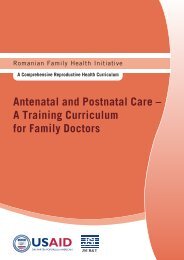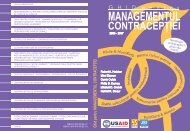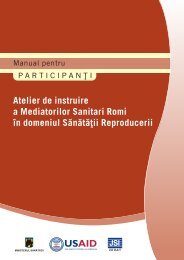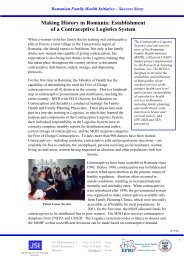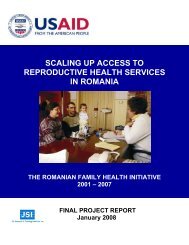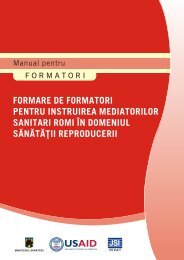Training of Roma Health Mediators in Reproductive Health
Training of Roma Health Mediators in Reproductive Health
Training of Roma Health Mediators in Reproductive Health
Create successful ePaper yourself
Turn your PDF publications into a flip-book with our unique Google optimized e-Paper software.
1) the woman comes to the mediator with a problem which she wants the mediator to<br />
help her with. In this case, the mediator uses her knowledge <strong>of</strong> reproductive health<br />
and her skills <strong>in</strong> active listen<strong>in</strong>g to try to help the woman resolve her problem.<br />
2) the mediator <strong>in</strong>itiates a discussion about reproductive health with a woman based<br />
on the mediator’s impression <strong>of</strong> the woman’s situation and possible benefits from<br />
chang<strong>in</strong>g certa<strong>in</strong> <strong>of</strong> her behaviors. In this case, the mediator <strong>in</strong>itiates a discussion<br />
with the woman, based on the mediator’s knowledge and/or observations <strong>of</strong> the<br />
woman’s situation.<br />
Expla<strong>in</strong> that, for the moment, we will consider approaches we can use to <strong>in</strong>itiate discussions<br />
<strong>of</strong> reproductive health with women <strong>in</strong> our communities.<br />
Ask the group:<br />
‣ Based on what you have learned about reproductive health, and what you know<br />
about reproductive health practices <strong>in</strong> your communities, <strong>in</strong> what k<strong>in</strong>ds <strong>of</strong> situations<br />
would you <strong>in</strong>itiate a discussion about reproductive health with a woman <strong>in</strong> your<br />
community?<br />
In relationship to my knowledge and/or observation that:<br />
• The woman is pregnant<br />
• The woman has a newborn/<strong>in</strong>fant<br />
• The woman has recently had an abortion<br />
• The woman has had many abortions <strong>in</strong> the past<br />
• The woman has several children and has problems tak<strong>in</strong>g care <strong>of</strong> them<br />
‣ For what purpose would you <strong>in</strong>itiate such a discussion?<br />
In order to f<strong>in</strong>d out the woman’s:<br />
• Perception <strong>of</strong> her situation (healthy, problematic, etc)<br />
• <strong>Reproductive</strong> health practices<br />
• Feel<strong>in</strong>gs about her situation<br />
• Knowledge <strong>of</strong> important pr<strong>in</strong>ciples that apply to her situation and if she is apply<strong>in</strong>g<br />
them; and if not, to see how we can help her to:<br />
o Become more knowledgeable<br />
o Change her behavior <strong>in</strong> ways that are healthier for her and for her children.<br />
Rem<strong>in</strong>d participants <strong>of</strong> the earlier discussions <strong>of</strong> the processes <strong>of</strong>:<br />
• 1) behavior change, and 2) decision-mak<strong>in</strong>g, and the fact that some women may<br />
decide to change their behavior relatively quickly while others may take years to<br />
change, or may never change.<br />
• Problem solv<strong>in</strong>g, and the fact that the <strong>in</strong>dividual is responsible for her behavior<br />
(although her situation may be complicated by other factors as well) and that the role<br />
<strong>of</strong> the mediator is to help her if she wants to change/solve her problem, and to<br />
provide <strong>in</strong>formation and other assistance to help her.<br />
218<br />
RFHI/JSI <strong>Roma</strong>nia <strong>Tra<strong>in</strong><strong>in</strong>g</strong> <strong>of</strong> RHMs <strong>in</strong> <strong>Reproductive</strong> <strong>Health</strong> Session 14: Interpersonal Communication



